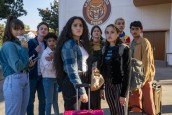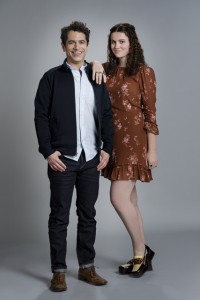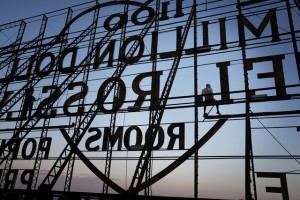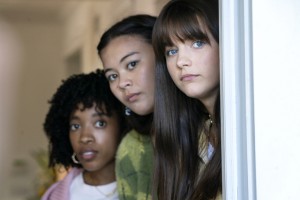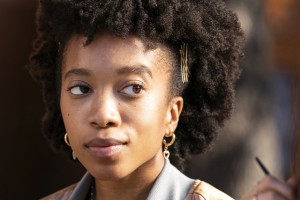GENERATION – or GENERA+ION – dropped the second half of its first season on Thursday, June 17, on HBO Max. Created by the father and daughter writing/producing team of Daniel Barnz and Zelda Barnz, with Daniel Barnz directing some episodes and his husband/Zelda’s father Ben Barnz as a fellow executive producer, GENERATION explores the intertwined lives of a group of Southern California high school students, as well as some of their teachers and friends.
Twins Nathan (Uly Schlesinger) and Naomi (Chloe East) go between being soulmates and mortal enemies. Nathan is starting to realize he may be more gay than bisexual, to the anguish of his conservative mother (Martha Plimpton). Nathan has a crush on the extroverted Chester (Justice Smith), who has fallen for school guidance counselor Sam (Nathan Stewart-Jarrett), who is in a panic over how this could affect his career. Greta (Haley Sanchez) and Riley (Chase Sui Wonders) are exploring their romantic feelings, encouraged by Greta’s aunt (Nava Mau), but threatened by the impending arrival of Greta’s mother. After not realizing she was pregnant, Delilah (Lukita Maxwell), just gave birth in a shopping mall bathroom, and, with the help of her friends, gave the baby over to a fire station. Aspiring comic Arianna (Nathanya Alexander) has two fathers, Patrick (John Ross Bowie) and Joe (J. August Richards), who are married to each other. Arianna is getting over dealing with Nathan’s ambivalence.
In an exclusive phone interview, creators Daniel Barnz and Zoe Barnz talk about GENERATION, their personal connection to the material, and more.
ASSIGNMENT X: Which came first, the idea for GENERATION, or the idea to write something together as daughter and father?
ZELDA BARNZ: It kind of all unfolded at the same time, to be completely honest. While we were beginning to think about this show for the very first time, we were always both attached to this project, I would say. It was never really like I had the idea and then asked my dad about it, or my dad got the idea to work with me and then we came up with this. It was just like, we were having all these conversations around our family dinner table about queerness, and identity, and teenagers, and youth, and we started discussing queer representation in media, and how some of these stories that I was bringing home from my own high school experience would be interesting in a TV show. And we started talking to each other, and just started developing together.
AX: So, you were seventeen/eighteen when you were writing this?
ZELDA BARNZ: I was sixteen when we pitched and wrote our first drafts. I was seventeen when the pilot was greenlit, and eighteen when the show was picked up to series.
AX: How much of this is based on your own high school experience, and how much of this is either, “Well, we’d like to illustrate this aspect of life,” or, “It would be interesting or entertaining if this happened”?
ZELDA BARNZ: There are definitely certain moments that were drawn from my own personal high school experience, specifically the [episode about the school] lockdown. That is very much drawn from my own experience in high school, and my own experience with lockdowns. But I would say that a lot of the show is more like us telling stories of experiences that aren’t necessarily drawn from personal experience. I definitely wouldn’t say that this show is based off of my own personal high school experience. I think certain moments are drawn from things I’ve been through, but I wouldn’t say that the entire show is in any way focused on what I went through, or a reflection of my own four years in high school.
AX: Where is GENERATION set? Is it supposed to be Anaheim, California?
ZELDA BARNZ: Yes.
DANIEL BARNZ: Yes. We set it in Anaheim because we wanted the environment to be big enough that it would be plausible to have this kind of diversity of characters, and also characters who identify in different ways across the sexuality and gender spectrums, i.e., not a small town, where it’s a little harder to buy that. But we also didn’t want it to be a city where it’s easy to find acceptance. So, that’s what drew us to Anaheim, in that it’s big enough to plausibly buy that all of these characters are going to high school together, but also a place where there is conservatism.
AX: And a community that would not have immediate, in-the-phone-book resources for LGBTQ and unplanned motherhood issues?
DANIEL BARNZ: Exactly, yeah.
AX: Were the two of you always planning on producing GENERATION, so it didn’t get taken away from you and turned into something unrecognizable?
DANIEL BARNZ: Yeah. It was never a given that the show was going to get made. In fact, our aspirations were much more modest and humble in the beginning, because just my experience, working in Hollywood, is that it’s really difficult to get shows made and on the air, let alone one that is as specific as this one is. But we always knew that should the show get made, that we were going to be really guiding it ourselves. Because the show is about queer teens, and what makes the show so special is that you have a creator who is herself a teen, so she can write this from the inside out in a way that is harder for us as adults. [With] a lot of high school shows, I think sometimes that element of inside-out authenticity can be missing. And honestly, at HBO, they always wanted Zelda front and center of the creative process, because they too understood that that’s what made it really special and original.
AX: Are there are characters that have popped for you, in seeing them performed, in ways that they didn’t on the page? That is, are there characters that have surprised you as they’ve been performed?
DANIEL BARNZ: [laughs] It’s a hard question to answer, only in that we’re just so in love with our cast, and feel that they are just such an extraordinarily talented bunch who, as a whole, have been able to bring nuance. As you know, the show moves between comedy and drama, and we’ve been blessed with actors who are really versatile. I think one character that was a real surprise for us is the character of Arianna, played by Nathanya Alexander. She’s an extraordinary person. It was interesting, because when we cast Nathanya, she came in and auditioned for a role that has a lot of irreverent comedy. And as we continued to develop the character, and began to explore some more sensitive and poignant and dramatic sides of her, we started seeing this performance come in from Nathanya that was so extraordinary. And when we saw that unfolding, then we embraced it and made sure that the character would always preserve her particular brand of irreverent outspokenness, but that we could also really explore a much deeper emotional side of that character as well.
AX: Would you like to say anything about John Ross Bowie and J. August Richards, who play Adrianna’s married-to-each-other dads?
DANIEL BARNZ: We feel so lucky to have them as part of our cast. The subtext for your question might also be, how closely do those dads parallel real life with Ben and me? I will say, the thing that we wanted to preserve with those dads and their daughter, Arianna, is a spirit of infectious irreverence, which is really true in our house, and a desire to not be too precious about things. Some of the other aspects of their life and their explorations are pure fiction, but we really felt blessed with these two actors, because their performances are just pitch-perfect, and you’ll see in the next set of episodes, there is an episode that really focuses on Arianna and her dads, and there are some really funny but also really poignant and beautiful moments that unfold between them and the family.
AX: In addition to LGBTQ issues, are you going to be addressing racial issue? Because you do have a multiracial cast, but the characters seem to be dealing with sexuality and interpersonal issues more than they are with race.
DANIEL BARNZ: I think that one of the great and really exciting challenges of the show is, how to tell stories of kids of color who identify in so many different ways across the gender and sexuality spectrum. And seeing how their queerness and their race plays their stories, but not force their stories to be defined by their queerness or their race. One of the things that Zelda observed about a lot of queer teen characters on television is, their storylines are often defined by their queerness. They’re not really permitted to be other people, besides a story of coming out, or a story of bullying. And one of the things that’s so refreshing about having all of these queer characters at the front and center of the show is, we can explore their queerness in their storylines, but we can also explore the other aspects of their lives. They can just simply be people. And that also, I think, applies to race and ethnicity.
So, you are seeing this play out with Greta, the Latinx character, and her aunt and her mother, and you’ll see that unfold even more in the second block. You are seeing it with Chester. He talks about his relationship with Sam, and what it means to be in the same space with another queer Black man. And again, in the second block, you’ll see Delilah and Riley, who are both Asian-American women, you’ll see those kinds of things factor into their storylines as well. So, we’re striving to find that perfect balance, where their race, gender identification, and sexuality can be a part of their storylines, but doesn’t have to define their storylines.
AX: Daniel, you direct some of the GENERATION episodes. Do you have any different feelings towards the episodes you direct and the episodes that you don’t direct?
DANIEL BARNZ: [laughs] It’s a great question. The answer is, no, I love them all. They are all my babies. I love directing. I really love directing, and I love getting to direct these actors, and some of these episodes, which were structurally a little bit complex. So, I couldn’t SOPHIE’S CHOICE between episodes that I directed and that I didn’t direct, because I love them all, and Zelda and I and the writers pour so much of ourselves into every episode in different ways. We identify so strongly with all of these characters in various ways. They’re all my beloved babies.
AX: Zelda, are you going to direct any GENERATION episodes?
ZELDA BARNZ: I don’t know yet, to be completely honest. Assuming that we do get a second season, which we don’t know yet, I think it would be really interesting, but I also plan on going to college, so I don’t totally know that I’ll have time. I really enjoy writing, and I don’t know that I’m really ready to direct yet.
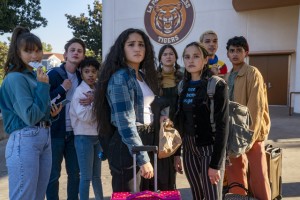
Chloe East, Uly Schlesinger, Nathanya Alexander, Haley Sanchez, Lukita Maxwell, Chase Sui Wonders, Justice Smith, Sydney Mae Diaz in GENERATION – Season 1 | ©2021 HBO/Warrick Page
AX: Did having GENERATION picked up change the way you were writing it at all? Did you either start feeling like, “Okay, this is really happening, so we should do X,” or did you start thinking, “Okay, this is really happening, and we have a budget that we can’t go over, so we’d better cut the episode where they get into a spaceship”?
ZELDA BARNZ: [laughs] I think our goal with our show was always to remain true to telling true stories and keeping it authentic, so I don’t know. I don’t know that the way we were writing it really changed when we realized that it had been picked up.
AX: Have you had much fan response to GENERATION? If so, what’s that been like?
ZELDA BARNZ: Yeah. I’ve definitely gotten a lot of amazing DMs on Instagram from people just talking about the show, and I connected with a couple of people who’ve been watching it. Our actors also, our cast, have gotten some really amazing responses from fans. It’s been really incredible talking to fans of the show.
DANIEL BARNZ: We have a very, very, very loyal and passionate fan base. And some of these responses that Zelda is talking about are really incredibly moving, from teenagers who feel seen in ways that they haven’t felt seen before. And this pile-on that goes on, on Twitter – the actors, the episodes, the characters. What’s really, really fun about it is, we’re so invested in these characters – we’ve been living and breathing them for years, and then to share them with this fan base that is equally as invested and excited. There was a moment, a Tweet that Zelda shared with me: somebody had taken a freeze-frame of a moment from our trailer for the second block, and noticed that Greta was wearing more rings, and then proceeded to set up a whole hypothesis about why she was wearing more rings, and what that might mean vis-à-vis her relationship with Riley. And to see that level of investment is so rewarding.
AX: Are you working on anything else right now?
DANIEL BARNZ: Zelda is working on figuring out what courses she’s going to take at college in the fall. We are still finishing off just a few pieces of post for this current block. And then Zelda’s other dad, my husband and producing partner, and I are actually working on another film, which is a true story about a queer black young man. So, I think we feel really fortunate to be able to collaborate and participate in all of these stories of queer kids of color. Because we’re not seeing it enough on the screen.
AX: And what would you both most like people to know about the second half of GENERATION Season 1?
DANIEL BARNZ: I think that if you liked the first block, you’ll really like the second block. It delivers on that particular brand of comedy and drama that we’re striving to create with this show. I think that it’s always been our hope that people will respond to this show because there is a kind of a boldness and a fearlessness to these characters, and the way that they walk through life. It’s something I’ve observed in Zelda and her friends group, and in many people of her generation. And it’s something that we wanted to really celebrate in our show. And that for me is what makes the show relevant and exciting for people of all generations, because I think there’s something that’s so magnetic about watching these kids – yes, very blonde, yes, making terrible, messy decisions, but also walking through life with a fearlessness that I think can inspire all of us.
ZELDA BARNZ: Yes. Definitely seconding that. We talk about the theme of mental health even more in the second block. We discuss certain characters’ struggles with mental health issues, and a lot of it is stuff that I can personally really relate to, so that’s been very important to me, that’s been a very important story to tell. And I think that a lot of teenagers can probably really relate to some of the issues we’re discussing in the second block. So, I’m excited for people to see that, I’m excited for people to see that representation on the screen.
DANIEL BARNZ: From my viewpoint, what’s incredible about so many Gen Z-ers is their openness in terms of talking about sexuality and gender identification. But there also is kind of a candor in talking about issues of mental health. These things were not true when I was growing up, around issues of sexuality and mental health, there was a lot of secrecy and shame. And what is incredible is to watch this open way that so many people in Gen Z will talk about how they identify across gender and sexuality spectrums, and also mental health issues. It’s so liberating to see that kind of shroud of secrecy and shame get lifted off of all of those narratives.
I love it when people say, “Oh, I didn’t think this show was going to be for me,” or “I thought it was going to be too much like this other show,” and “I don’t generally like this genre, but somehow I found myself connecting to this show.” People say, “I don’t know, I’m a straight, white, cis[-gendered] middle-aged guy, I really didn’t think this was going to be for me, and I was able to connect with the show.” Those are incredible compliments to receive.
That was always our hope. One of the inspirational reference points for the show for us was FRIDAY NIGHT LIGHTS. Which seems like an odd point of comparison. Zelda and I both loved that show, and we’re not from Texas, we barely understand football, but we loved those characters and those stories so intensely. And so I think we always hoped that, no matter who you were, that you could fall in love with these teenagers, and that people from all different walks of life could see themselves in these teenagers, and either are themselves teenagers, and watching the show, and be like, “Yeah, that’s what it feels like to love and live,” or you’re of my generation, and you watch and think, “God, yes, that is how it felt.” And maybe these kids are dressing differently, they’re certainly communicating differently, and speaking differently, but there’s something that’s really universal about that teen thing of trying to figure out who you are, that can resonate with so many different people.
Related: Exclusive Interview: Nathanya Alexander gives the scoop on Season 1 of GENERATION
Follow us on Twitter at ASSIGNMENT X
Like us on Facebook at ASSIGNMENT X
Article Source: Assignment X
Article: Exclusive Interview: Creators Daniel Barnz and Zelda Barnz chat Season 1 of GENERATION
Related Posts:




